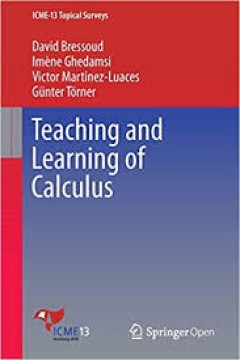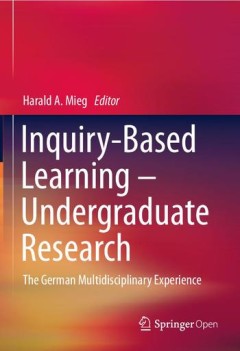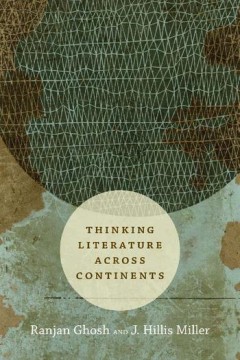Filter by
# Debug Box
/var/www/htdocs/pustaka-digital/lib/SearchEngine/SearchBiblioEngine.php:688 "Search Engine Debug 🔎 🪲"
Engine Type ⚙️: "SLiMS\SearchEngine\SearchBiblioEngine"
SQL ⚙️: array:2 [ "count" => "select count(sb.biblio_id) from search_biblio as sb where sb.opac_hide=0" "query" => "select sb.biblio_id, sb.title, sb.author, sb.topic, sb.image, sb.isbn_issn, sb.publisher, sb.publish_place, sb.publish_year, sb.labels, sb.input_date, sb.edition, sb.collation, sb.series_title, sb.call_number from search_biblio as sb where sb.opac_hide=0 order by sb.last_update desc limit 10 offset 5390" ]
Bind Value ⚒️: []

Teaching and learning of calculus
This “ICME-13 Topical Survey” aims to give a view of some of the main evolutions of the research in the field of learning and teaching Calculus, with a particular focus on established research topics associated to limit, derivative and integral. These evolutions are approached with regard to the main trends in the field of mathematics education such as cognitive development or task design…
- Edition
- -
- ISBN/ISSN
- 9783319329741
- Collation
- -
- Series Title
- -
- Call Number
- 515 BRE t

Women and migration: responses in art and history
- Edition
- -
- ISBN/ISSN
- 9781783745678
- Collation
- 670 p.; 24 cm.
- Series Title
- -
- Call Number
- -
- Edition
- -
- ISBN/ISSN
- 9781783745678
- Collation
- 670 p.; 24 cm.
- Series Title
- -
- Call Number
- -

Oral literature in Africa
- Edition
- -
- ISBN/ISSN
- 9781906924720
- Collation
- xliv + 570 p. ; 24 cm.
- Series Title
- -
- Call Number
- -
- Edition
- -
- ISBN/ISSN
- 9781906924720
- Collation
- xliv + 570 p. ; 24 cm.
- Series Title
- -
- Call Number
- -

Science as social existence: heidegger and the sociology of scientific knowledge
n this bold and original study, Jeff Kochan constructively combines the sociology of scientific knowledge (SSK) with Martin Heidegger’s early existential conception of science. Kochan shows convincingly that these apparently quite different approaches to science are, in fact, largely compatible, even mutually reinforcing. By combining Heidegger with SSK, Kochan argues, we can explicate, elab…
- Edition
- -
- ISBN/ISSN
- 978-1783744114
- Collation
- 444 p.
- Series Title
- -
- Call Number
- -

Inquiry-based learning -- undergraduate research : the German multidisciplina…
This open access book provides a systematic overview of experiences with Inquiry-Based Learning (IBL) and undergraduate research (UR) in German universities, covering both research universities (Universitäten) and universities of applied sciences (Fachhochschulen). Divided into three parts, the book starts with the principles and common practices of IBL/UR at all universities. Part Two discuss…
- Edition
- -
- ISBN/ISSN
- 9783030142230
- Collation
- xvi, 406p. : ill.
- Series Title
- -
- Call Number
- 378 INQ i

Universities, innovation and the economy
Universities are increasingly expected to be at the heart of networked structures contributing to society in meaningful and measurable ways through research, the teaching and development of experts, and knowledge innovation. While there is nothing new in universities’ links with industry, what is recent is their role as territorial actors. It is government policy in many countries that univer…
- Edition
- -
- ISBN/ISSN
- 9781134344185
- Collation
- xii, 265p. : ill.
- Series Title
- -
- Call Number
- 338.476200094 SMI u

Universities in transition : foregrounding social contexts of knowledge in th…
Universities are social universes in their own right. They are the site of multiple, complex and diverse social relations, identities, communities, knowledges and practices. At the heart of this book are people enrolling at university for the first time and entering into the broad variety of social relations and contexts entailed in their ‘coming to know’ at, of and through university. By r…
- Edition
- -
- ISBN/ISSN
- 9781922064837
- Collation
- xi, 244p. : ill.
- Series Title
- -
- Call Number
- 378.1980994 UNI u

Making publics, making places
This book focuses on the surprising generative possibilities which digital and smart technologies offer media consumers, citizens, institutions and governments in making publics and places, across topics as diverse as Twitter audiences, rural news, the elasticity of the public sphere, Weibo, cultural heritage and responsive spaces in smart cities. Multidisciplinary perspectives engage with crit…
- Edition
- -
- ISBN/ISSN
- 9781925261431
- Collation
- xviii, 216p. : ill.
- Series Title
- -
- Call Number
- 307.76 MAK m

Early start : preschool politics in the United States
In the United States, preschool education is characterized by the dominance of a variegated private sector and patchy, uncoordinated oversight of the public sector. Tracing the history of the American debate over preschool education, Andrew Karch argues that the current state of decentralization and fragmentation is the consequence of a chain of reactions and counterreactions to policy decision…
- Edition
- -
- ISBN/ISSN
- 9780472118724
- Collation
- x, 274p. : ill.
- Series Title
- -
- Call Number
- 372.210973 KAR e

Thinking literature across continents
'Thinking Literature across Continents' finds Ranjan Ghosh and J. Hillis Miller—two thinkers from different continents, cultures, training, and critical perspectives—debating and reflecting upon what literature is and why it matters. Ghosh and Miller do not attempt to formulate a joint theory of literature; rather, they allow their different backgrounds and lively disagreements to stimulate…
- Edition
- -
- ISBN/ISSN
- 9780822373698
- Collation
- xiii, 316p. : ill.
- Series Title
- -
- Call Number
- 809 GHO t
 Computer Science, Information & General Works
Computer Science, Information & General Works  Philosophy & Psychology
Philosophy & Psychology  Religion
Religion  Social Sciences
Social Sciences  Language
Language  Pure Science
Pure Science  Applied Sciences
Applied Sciences  Art & Recreation
Art & Recreation  Literature
Literature  History & Geography
History & Geography